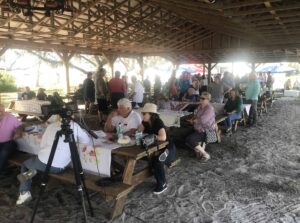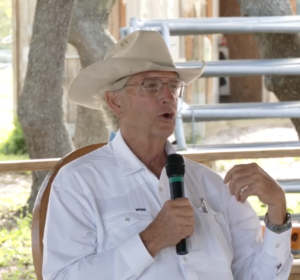At Dakin’s Dairy Farm, Trumperstickers mingle with rainbow logos. The common enemy: Sprawl.
By Johannes Werner
Original Air Date: Feb. 14, 2024

Crowd at the event
Host: You don’t get to see that every day – the grassy overflow parking lot at Dakin’s Dairy Farm just west of Myakka City was packed with vehicles, for one. But most remarkably, there were all-terrain pickups with trumperstickers mingling with the latest plug-in Priuses, complete with rainbow-colored slogans. What brought the owners of these vehicles together was concern over “The Future of Agriculture in Manatee County”. That was the title of a panel discussion featuring four prominent farmers. Our news team was there, ready to report about culture clash.
Johannes Werner: To say it right away: There were only few hints of culture shock. And that was – in great part – thanks to Jim Strickland, who bridged any potential gaps. He was wearing his 10-gallon hat and boots, and – like his three fellow panelists – Strickland was joking about the other guys’ riding skills and laying out the challenges of keeping the farm going. But the former head of the Florida Cattlemen’s Association and probably biggest rancher and agricultural landowner in the region also keeps talking about climate change and rising sea levels. About the urgent need to fund more research. And about the pressure land-hungry real estate developers put on farming families. He began with a description of the rapid disappearance of agricultural land, and a pitch to voters.

Jim Strickland
Jim Strickland: They have been losing somewhere in the neighborhood of 1–1.5% of that land in the last 10 years. So if we have to 220,000 acres, that tells us we’re definitely going to be losing that amount. I think if the economy stays the way it is, we’re going to see that escalate.
So how much do we need? That’s the question that a lot of people ask. Well, how much land is enough? We don’t have enough, in my opinion, we don’t have enough data and research yet to predict what Florida is going to look like accurately for the next 100 years, or the next 200 years, or the next 500 years, so how much is enough?
I think it depends upon the voters and what they feel is enough financially because all that money comes from you. The legislature can put it into different pots, but it all comes from you. So if you believe in conservation, I think we can see those numbers rise. On a county level, on a state level, and on a federal level.
JW: Moderator Katie Close asked how much land needs to be set aside to keep agriculture going. Gary Reeder, one of the few remaining tomato growers in what was once the tomato capital of the United States, suggested pretty much every acre — in other words, a moratorium on any rezoning of agricultural land. He hedged his bets by saying that this is not reasonable; but he left it to the voters to decide.
Gary Reeder: If we don’t curb some of the development — and again, that’s the voter’s choice if they want to see that — if we don’t curb some of that development, we’re not going to have any more farmland.

Gary Reeder
From this area right here to the West is a potentially developmental area. From this area to the East, there’s a lot of conservation easements. There’s a lot of land that’s owned by the mines. And it’s not going to be as pro-development East of us as what it is West of us. So in that time frame, I guess I would say that I would like to keep all of it that we have now, but I know that’s not reasonable.
JW: Reeder is also the head of the Manatee County Farm Bureau.
Strickland’s peers – Jerry Dakin, Gary Reeder and Luke Davis – fielded arguments that have been heard for many years. Jerry Dakin – whose family recently decided to sell – described the challenges of keeping the farm going and raised the issue of food security as national security. The moderator picked up that train of thought and drove it a little further, asking – tongue in cheek – what foreign food producers the panelists would prefer to depend upon. Luke Davis, head of the local chapter of the Cattlemen’s Association, put it in stark terms.
Luke Davis: If it’s not in the U.S., we’re gonna become indentured servants to another country. We’re going to become slaves to somebody else. And that’s where we’re headed. Overdevelopment is going to attack us at our root core.
JW: Tomato grower Reeder harked back to NAFTA and unfair Mexican competition. He didn’t have any kind words either for the Trump administration’s makeover of that free trade agreement. Reeder was seconded by Janet Mixon, whose Mixon Farms recently shut down, after three generations. Joining the panel from the audience, she went off on a rant about how plant diseases enabled by free trade destroyed her family business.
But it was Strickland who made the most hands-on political pitch. He said there should be public money for carbon sequestration, and funding for land conservation easement grants. That’s a mechanism under which the government and non-profits pay a one-time per-acre sum to farmers to make sure the next generation will use the land for farming.
Strickland pointed out that the state legislature has committed upwards of $100 million in recurring funding to conservation easement programs.
JS: There’s several great glimmers of hope here. Great glimmers of hope. The legislature about two years ago passed the wildlife corridor bill, and it said we’re going to prioritize all conservation easement sales and all fee-simple sales, we would like to focus and concentrate on a wildlife corridor which stretches back across Florida. The governor recently has put a recurring $100 million into DEP’s conservation program, which is called Florida Forever.
So the legislature funded $300 million for the Florida Department of Agriculture. The governor has as it identified as recurring, which means every year we don’t have to get up there and fight for a budget. We know there’s going to be $100 million in there for conservation easements.
Manatee County, circling back around, is within the wildlife corridor. So that means we have the opportunity here in Manatee County, along with a lot of other counties, to be prioritized when it comes to buying conservation easements.
JW: But to make the Florida Wildlife Corridor come true would require billions.
JS: It all boils down to money. I think I’ll say it one more time: It all is about the money. And it’s your money. It’s not our money. It’s your money. So that 98%, if you live here, 98% is really running our businesses. So we appreciate the help and the media that write the good stories that show the good show. So thank you all.
JW: The organizers of the event are a grassroots group called East Manatee Preservation. The activists, many of them residents in the area living on large-lot homesteads, have been fighting a — so far — losing battle against suburban sprawl spilling over the county’s generation-old urban development boundary.
Will anything come of it? For one, when farmers call, elected officials listen. Present at the event was one sitting Manatee County commissioner, George Kruse, as were several candidates for county commission. Also there was State Representative Tommy Gregory.
Stacy Jessee of East Manatee Preservation urged followers to take action on behalf of agriculture, by calling county commissioners and state legislators. “We are concerned about the future of agriculture in our county and state,” she wrote in a follow-up email. “We want to see our local and state officials support legislation that prioritizes the importance of our agricultural industry.”
This has been Johannes Werner, reporting for WSLR News.
WSLR News aims to keep the local community informed with our 1/2 hour local news show, quarterly newspaper and social media feeds. The local news broadcast airs on Wednesdays and Fridays at 6pm.